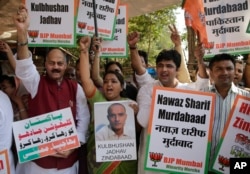Pakistan granted permission Friday for the wife and mother of a convicted Indian death row prisoner to visit him later this month.
Former Indian naval officer Kulbhushan Jadhav was arrested in March 2016 in the southwestern province of Baluchistan for entering Pakistan on fake identity documents to plot subversive acts.
A military court tried and sentenced him to death in April, ruling "the serving commander of the Indian navy" was found guilty of espionage and terrorism against the country.
Acting on a request through diplomatic channels from Jadhav’s family, Pakistan conveyed to India last month it was ready on “purely humanitarian grounds” to arrange a meeting with his wife and mother.
“The visit should happen on December 25, 2017. A diplomat from the Indian High Commission in Islamabad will be allowed to accompany the visitors. Requisite security would be provided to the visitors,” foreign ministry spokesman Mohammad Faisal told reporters on Friday.
India rejects charges
New Delhi admits Jadhav is a former officer of the Indian navy but rejects the charges against him as baseless, saying Jadhav has no connection with the government.
India alleges Jadhav was kidnapped and brought to Baluchistan from neighboring Iran.
Pakistani officials insist Jadhav has "confessed before ... the [military] court that he was tasked by RAW [Indian spy agency] to plan, coordinate and organize espionage, terrorist and sabotage activities aimed at destabilizing and waging war against Pakistan.”
India asked the International Court of Justice (ICJ) in May to restrict Pakistan from executing Jadhav, arguing he was denied diplomatic assistance during what it called an “unfair trial.”
The ICJ suspended the execution, pending final judgment by the court.
Appeal pending
Jadhav has filed an appeal with Pakistan's military chief, General Qamar Javed Bajwa, to seek clemency, which is still pending.
In a transcript of his confession, which was released by Pakistan's military, Jadhav said a major goal he was assigned by the Indian intelligence agency was to disrupt a multibillion-dollar infrastructure project in Pakistan being funded by China.
Relations between India and Pakistan have deteriorated and a bilateral peace dialogue also remains suspended. The tensions have led to frequent border clashes between the nuclear-armed rivals across the cease-fire line in the disputed territory of Kashmir.
The latest clashes occurred on Thursday evening in which two civilians were killed, according to Pakistani officials.
“In 2017, more than 1,300 Indian cease-fire violations, the highest ever in the recent past, have resulted in the deaths of 52 (people) and 175 injured,” asserted Pakistani spokesman Faisal at Friday’s news briefing.
Pakistani military officials allege mostly civilians have fallen victim to the cross-border firing because Indian troops deliberately target civilian population near the Line of Control that separates Indian and Pakistani portions of Kashmir.
For its part, India blames Pakistani forces for initiating the skirmishes in their bid to allow militants to cross over to the Indian side of the divided Himalayan territory for plotting terrorist attacks and fuel a separatist Muslim insurgency in Kashmir.
Islamabad denies the charges.





